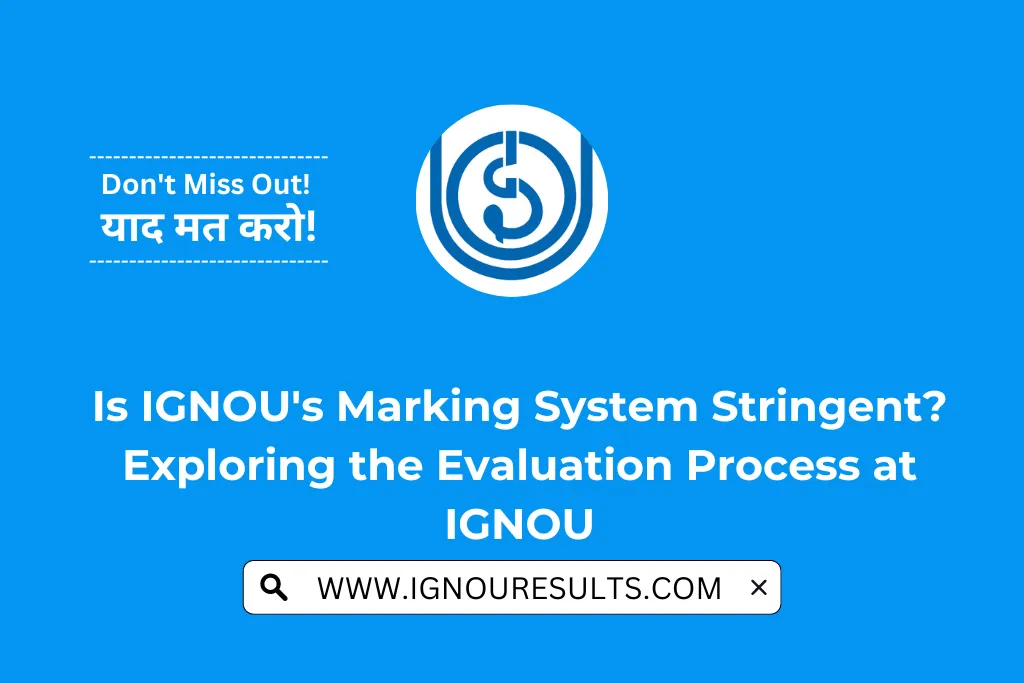IGNOU Marking Policy Exposed: What You Need to Know
When it comes to distance education in India, the Indira Gandhi National Open University (IGNOU) stands out as one of the largest and most renowned institutions. Aspiring students often wonder about the evaluation process at IGNOU and whether the university follows strict marking criteria. In this article, we will explore the topic of IGNOU’s marking system and shed light on the factors that determine the strictness of evaluation.

Understanding IGNOU Marking Policy
At IGNOU, the evaluation process consists of two main components: assignment submission and term-end examinations.
Assignment submission and evaluation
IGNOU assigns various assignments to students throughout the academic year. These assignments are designed to assess the students’ understanding of the course material. Once the assignments are submitted, they are evaluated by a team of experienced evaluators appointed by the university.
Term-end examinations
Apart from assignments, IGNOU also conducts term-end examinations for each course. These examinations are conducted at designated centers, where students are required to appear in person. The exams are held to evaluate the students’ overall knowledge and comprehension of the subject matter.
Factors that influence the strictness of IGNOU Marking Policy
The strictness of marking at IGNOU can vary based on several factors. Let’s take a closer look at these factors:
Subjective vs. objective assessments
Some courses at IGNOU involve subjective assessments, where evaluators need to assess the depth and quality of students’ responses. On the other hand, objective assessments rely on predetermined answers or multiple-choice questions. Subjective assessments allow more room for interpretation, which can influence the strictness of marking.
Standardized evaluation guidelines
IGNOU provides evaluators with detailed evaluation guidelines for each course. These guidelines act as a benchmark for marking assignments and examinations. While they ensure consistency in evaluation, the adherence to these guidelines may vary among evaluators, leading to differences in strictness.
Quality of responses
The quality of responses provided by students significantly affects the marking process. Clear, well-structured, and comprehensive answers are likely to receive higher marks. On the contrary, vague or incomplete responses may result in lower scores. Therefore, it is crucial for students to provide accurate and relevant information in their answers.
Examiner’s discretion
IGNOU evaluators have a certain level of discretion when it comes to marking. They take into account various factors such as the student’s ability to present arguments, critical thinking, and overall understanding of the subject. This discretion can contribute to variations in strictness across different evaluators.
Debunking common myths about IGNOU Marking Policy
There are several misconceptions surrounding IGNOU’s marking system. Let’s address some of the common myths and understand the reality:
- Myth: IGNOU follows a very lenient marking approach.
- Reality: IGNOU maintains strict evaluation standards to ensure academic integrity and uphold its reputation.
- Myth: IGNOU fails a significant number of students.
- Reality: IGNOU strives to provide opportunities for students to improve their performance and succeed. Failure is not the objective, but rather an indicator of areas that require improvement.
Tips for scoring well in IGNOU assessments
To maximize your chances of scoring well in IGNOU assessments, consider the following tips:
- Understand the question paper pattern: Familiarize yourself with the format and structure of the question paper to prepare accordingly.
- Prepare comprehensive and structured answers: Provide detailed responses, supporting your arguments with relevant examples and citations. Structure your answers logically and prioritize key points.
- Manage your time during examinations: Allocate time wisely for each question, ensuring you have enough time to complete the entire paper.
Conclusion
In conclusion, IGNOU follows a comprehensive evaluation process that includes assignments and term-end examinations. The strictness of marking can vary based on subjective assessments, standardized guidelines, the quality of responses, and the evaluator’s discretion. It is essential for students to understand the evaluation criteria and prepare well to score effectively. By debunking common myths and following the provided tips, students can enhance their chances of achieving good results.
FAQs
- Q: How important are assignments in IGNOU’s evaluation process?
- A: Assignments hold significant weightage in IGNOU’s evaluation process as they assess the students’ understanding of the course material.
- Q: Can I expect lenient marking in objective assessments?
- A: While objective assessments may have predetermined answers, the marking criteria and strictness remain consistent across all assessments.
- Q: How can I request re-evaluation of my marks?
- A: IGNOU provides a re-evaluation process where students can apply for a reassessment of their marks. The university has specific guidelines and deadlines for this process.
- Q: Are evaluators aware of the identity of the students while marking?
- A: No, evaluators mark the assignments and answer sheets anonymously, ensuring an unbiased evaluation process.
- Q: Does IGNOU conduct moderation of marks?
- A: Yes, IGNOU has a moderation process to ensure fairness and consistency in marking. The moderation aims to maintain uniformity across different evaluators and centers.